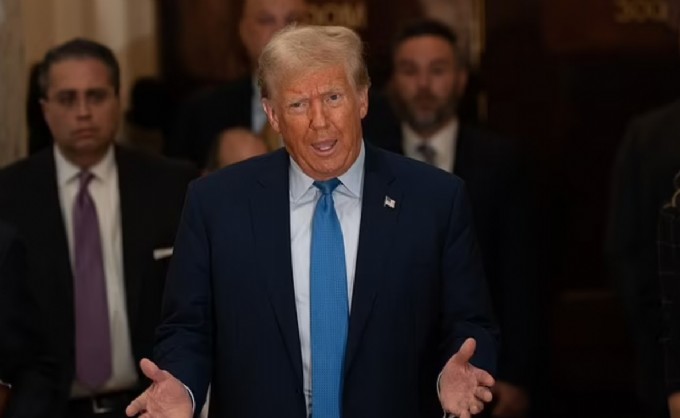Fabulous
Judge fines Trump more than $350 million in NY Civil Fraud Trial
Trump and Family Business Slapped with $364 Million Fine in New York Civil Fraud Trial.

In a landmark verdict stemming from a contentious three-month-long trial, former President Donald Trump and his family business have been hit with a staggering $364 million fine in a New York civil fraud case. The trial, which captured national attention, delved into allegations of widespread exaggeration of property values by Trump's enterprises to secure favorable loan terms from financial institutions.
The presiding judge, Arthur Engoron, had previously found Trump and his sons, Don Jr. and Eric, liable for fraud. The recent trial was convened to determine the magnitude of the financial penalty to be imposed. The case was initiated by New York Attorney General Letitia James, who sought over $370 million in damages and advocated for Trump's prohibition from conducting business activities within the state.
Accusations levied against Trump and his businesses revolved around allegations of inflating net worth by billions of dollars, with James contending that such deceptive practices warranted a permanent ban on Trump's involvement in New York's real estate sector. Throughout the trial, Trump vehemently denied any wrongdoing, characterizing the legal proceedings as politically motivated persecution orchestrated by his adversaries.
Despite Trump's assertions of innocence, Judge Engoron's ruling underscored the gravity of the accusations, affirming that Trump had engaged in fraudulent practices by submitting inflated estimates of his net worth to financial institutions. One notable discrepancy highlighted during the trial was the valuation of Mar-a-Lago, Trump's opulent Florida estate, which was assessed at a fraction of the value claimed by Trump during loan applications.
Similarly, Trump's Trump Tower penthouse came under scrutiny, with prosecutors alleging a significant overvaluation facilitated by inflated square footage estimates. Despite Trump's staunch defense and claims of success in building a real estate empire, the court's verdict reinforced the severity of the fraud allegations.
In a poignant showdown preceding the trial, Trump's deposition at James' Manhattan office provided a glimpse into the combative nature of the legal battle. The closed-door session, spanning seven hours, captured Trump's vehement denunciation of the lawsuit as a personal affront, underscoring his perception of being unfairly targeted by authorities.
However, legal experts have voiced concerns regarding the precedent set by James' victory, warning of potential ramifications for future business litigation. Adam Leitman Bailey, a prominent New York real estate lawyer, cautioned that the ruling could establish a detrimental precedent, potentially facilitating unwarranted business closures in the absence of clear evidence of victimization or substantial losses.
Highlighting the rarity of such outcomes under New York's anti-fraud statute, Executive Law 63(12), previous cases resulting in business dissolution predominantly involved tangible harm to victims. Instances cited include the misappropriation of charitable funds, financial malfeasance in private equity firms, and neglectful practices in healthcare facilities.
While the verdict in Trump's case marks a significant legal milestone, it also prompts broader conversations about the implications for future business litigation and regulatory enforcement efforts. As the legal landscape continues to evolve, the fallout from Trump's civil fraud trial is poised to resonate across the realms of politics, business, and law, shaping precedents and perceptions for years to come.

Jennifer Lopez looks ageless in a towel in no-makeup video

Amanda Holden spanks her derriere and thanks Spanx

Amanda Holden shows off more than bargained as she dances around in her outfit of the day

Italian models Giulia Salemi and Dayane Mello looks glam

Meet Harley Cameron, the stunning model who went from a BKFC ring girl to become a pro wrestler and found love

GreenGirlBella, Rocks Emirates Stadium in Painted Home Kit

Amanda Holden calls herself a 'good girl' in white dress with 'cheeky' split

Mum slammed by parents after flashing thong in school run outfit

Lottie Moss makes jaws dropp as she shows off her flawless body








Comments
Written news comments are in no way https://www.showbizglow.com it does not reflect the opinions and thoughts of. Comments are binding on the person who wrote them.